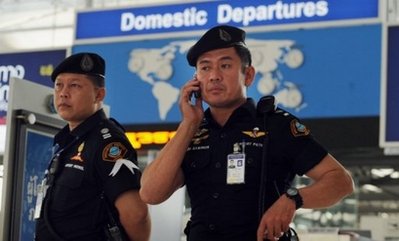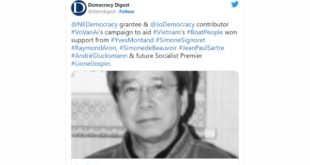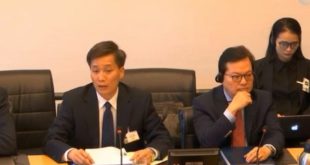BANGKOK, 13 September 2010 (AFP) – Thailand has refused entry to two human rights campaigners due to speak at a Bangkok press conference Monday about alleged abuses in neighbouring Vietnam, a journalists’ organisation said.
 |
|
|
Airport security officers are seen at Suvarnabhumi international airport in Bangkok. Thailand has refused entry to two human rights campaigners due to speak at a Bangkok press conference Monday about alleged abuses in neighbouring Vietnam, a journalists’ organisation said (AFP/File/Saeed Khan).
|
The move forced the Vietnam Committee on Human Rights (VCHR), a long-time critic of the country’s communist regime, to cancel the event at the Foreign Correspondents’ Club of Thailand (FCCT), the media group said.
The FCCT said on Sunday it had been asked by Thailand’s Foreign Ministry not to allow its premises to be used for the news conference “as it might contain information detrimental to a neighbouring country.”
Thai and Vietnamese authorities were not immediately available to comment.
The exile rights group was to present a report alleging that rights abuses have continued unabated during Vietnam’s presidency of the Association of Southeast Asian Nations (ASEAN), a group that also includes Thailand.
“Both civil and political rights as well as economic and social rights are being flagrantly violated in Vietnam,” according to a summary of the report, which alleges at least 258 “prisoners of conscience” are languishing in Vietnam’s jails.
“Economic liberalisation under a one-party system with no independent judicial oversight has resulted in endemic corruption,” it added.
One of the speakers, Vo Van Ai, was contacted by the Thai embassy in Paris the day before he was due to fly to Bangkok and informed that he would not be allowed to enter the country, following a request by Vietnam, VCHR said.
The other, Penelope Faulkner, was told at a Paris airport that she would not be allowed to board her flight.
“This is frightening: it illustrates that it is impossible to speak about Vietnam’s human rights record not only in Vietnam, but also in neighbouring countries”, Souhayr Belhassen, president of the International Federation for Human Rights, which co-authored the report, said in a statement.
Critics say Thailand’s record on freedom of expression — already controversial because of Internet censorship driven by strict rules over insulting the monarchy — has worsened since deadly protests in April and May.
Authorities have used emergency powers to arrest hundreds of people suspected of involvement in two months of mass opposition demonstrations in Bangkok and to silence anti-government media.
 Quê Me Quê Me: Action for democracy in Vietnam & Vietnam Committee on Human Rights
Quê Me Quê Me: Action for democracy in Vietnam & Vietnam Committee on Human Rights




